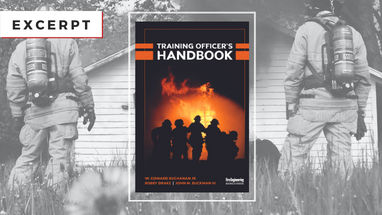Apr 12th 2024
Excerpt: Training Officer's Handbook
An Attitude of Success
An attitude of success is essential for the fire service to operate effectively. As firefighters, we must believe we can do things that others would dare not try. We are successful in these endeavors thanks to our teamwork, training, equipment, and experience. The fire department can arrive quickly to unforeseen life-and-death emergencies and quickly control these situations, no matter their complexity or chaotic presentation. The fire department doesn’t get to lose. A loss for team fire department is a failure to perform. We cannot control what happens before our arrival; we can’t always control who lives and who dies; but we must always respond to whatever conditions are present when we arrive and perform appropriately. It is our attitude of success that gives us the platform to do the greatest good for the greatest number of people on our arrival.
 As a coach and mentor, we must observe our own attitudes toward the challenges we face daily. Everyone faces challenges of some sort every day. As the training officer, you will serve as a role model in how you respond to life’s daily challenges.Those with an attitude of success have a particular response to challenges as they present themselves, while those lacking an attitude of success may perceive challenges differently. Once you begin observing your own attitude and the attitude of others, you can spot the differences quickly.
As a coach and mentor, we must observe our own attitudes toward the challenges we face daily. Everyone faces challenges of some sort every day. As the training officer, you will serve as a role model in how you respond to life’s daily challenges.Those with an attitude of success have a particular response to challenges as they present themselves, while those lacking an attitude of success may perceive challenges differently. Once you begin observing your own attitude and the attitude of others, you can spot the differences quickly.
Consider an Olympic athlete that has trained for a lifetime to compete in a specific sport. They spend years perfecting a set of skills that ultimately culminate in a competition that they will likely only get to participate in once. Everything they have worked toward for most of their life comes down to this one moment. Imagine the sports broadcaster with their camera and microphone interviewing the athletes just before they compete for all the marbles.
The broadcaster asks the athlete that infamous question, “How do you feel right now?” The athlete’s response can speak volumes about their attitude toward success. Let’s consider a few examples:
Athlete A says, “I’m excited to compete! I’ve trained my whole life for this moment, and I can’t wait to get out there and win this thing!”
What does Athlete A’s response imply? I’m excited! I’ve been waiting a long time to do this. I’ve put in years of training and hard work and I’m ready. I finally get to do what I’ve worked so hard for, and I’m ready. The response implies confidence that they’ve prepared mentally and physically for the event and can rest their mind knowing they’ve done all they can do to prepare.
Athlete B says, “I’m nervous! I hope I’ll have a good day out there today and things go my way. My stomach is in knots, but I’m going to do my best!”
What does Athlete B’s response imply? How is nervousness a different response than excitement? The difference lies in the confidence of Athlete A versus Athlete B. Athlete A has put in the work and is confident in their ability—not cocky, just confident. Athlete B implies there is a shadow of a doubtregarding their preparation. They did almost everything they needed to prepare, but maybe there was something they missed or could have done better. While the difference in performance between the two may be a fraction of a second or point, the differences in attitude and outcome of the competition are profound.
An attitude of success is evident by creating a developmental plan to prepare for a potential challenge, executing that plan to completion, and testing the capabilities gleaned from the plan in real-world scenarios. It’s the difference between thinking you can versus knowing you can. Once that attitude is achieved, you can get out of your own way and let things take care of themselves. The team will simply win; the band will simply play; the fire will simply go out.
The mission of the training officer is to monitor their attitude toward success and model that attitude as best they can to their members. Members will observe your response to challenges and follow your example. The training officer must find ways to coach and mentor an attitude of success in their members by demonstrating the effort and work required to maintain such an attitude. Demonstrate that every challenge is an opportunity to learn. Even if you feel you didn’t win a particular situation, you were at least given the gift of learning. Maintaining such an attitude is a lifelong journey that never ends. This chapter will offer some basic skills the training officer can use to foster an attitude of success in their members and themselves.

